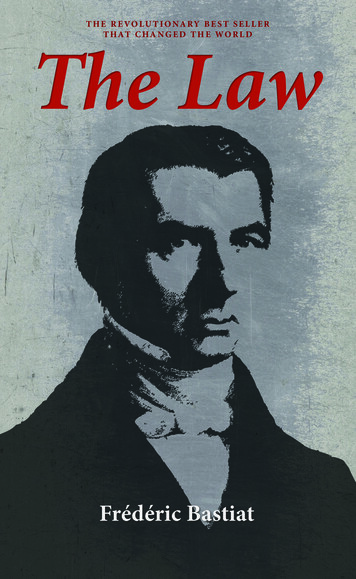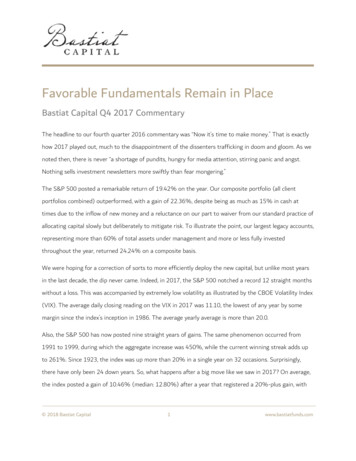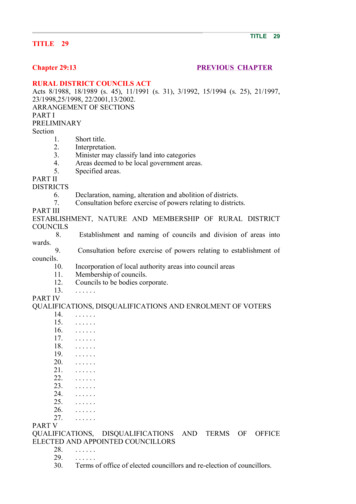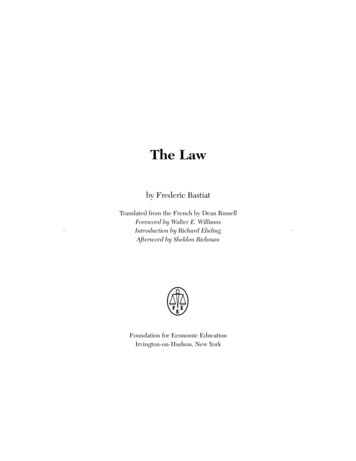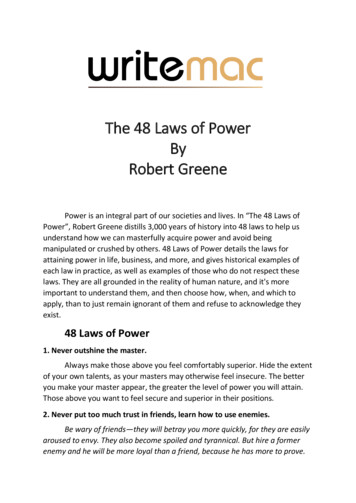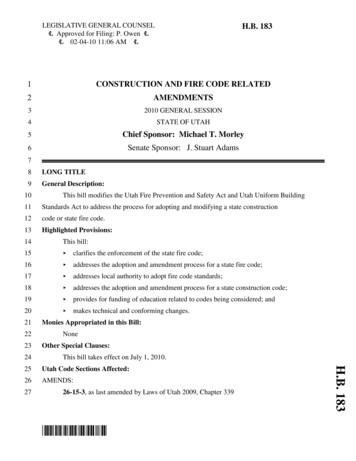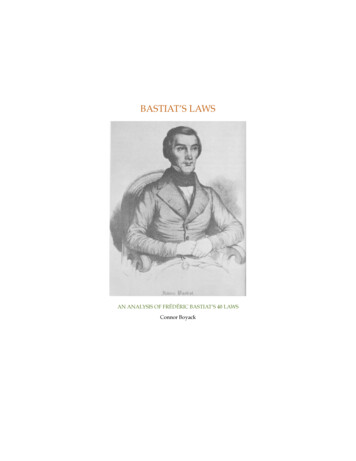
Transcription
BASTIAT’S LAWSAN ANALYSIS OF FRÉDÉRIC BASTIAT’S 40 LAWSConnor Boyack
All source quotes provided herein are from the following books: (BC1) Bastiat, Frédéric. The Bastiat Collection. Volume 1. Auburn, Alabama: Ludwig Von MisesInstitute, 2007. (BC2) Bastiat, Frédéric. The Bastiat Collection. Volume 2. Auburn, Alabama: Ludwig Von MisesInstitute, 2007. (SE) Bastiat, Frédéric. Selected Essays on Political Economy. Hudson, New York: The Foundationfor Economic Education, 1995.1. There are natural laws which are above man.Source quote(s)“For, if there be general laws that act independently of written laws, and of which the latter can only regulate theaction, we must study these general laws. They can be made the object of a science, and Political Economyexists.” (BC2, p. 22)“Human law should coincide with the natural law. It should facilitate and ensure the just retribution of men’s acts; inother words, in should circumscribe solidarity, and organize reaction in order to enforce responsibility.“In acting thus, the law conforms itself to the nature of things. . . .” (BC2, p. 565)CommentaryBastiat argues in several of his writings that government is the collective force inherently possessed by individuals.The powers vested in individuals are given freely and equally to all men, from his Creator. As such, man isunauthorized and morally unable to restrict or remove such powers, since he is not the person who granted them.For this reason, Bastiat argues that we must understand the natural/general laws, so that the laws we as humanscreate can be correctly and morally based.2. There is a natural order in the universe which is the sum of all naturallaws.Source quote(s)“Natural social laws are the phenomena, taken in the aggregate, and considered in reference both to their motivesand their results, that govern the transactions of men in a state of freedom.” (BC2, p. 119)CommentaryJust as a society is constructed according to the laws under which they live, so too is there an order of thingsproduced through natural law. This aggregate of which Bastiat speaks is commonly referred to as Nature—thetotality and common existence of natural law.Bastiat’s 40 LawsConnor Boyack2
3. Man’s law is only as effective as it is based on Natural Law.Source quote(s)“And yet, it may be asked, have these questions any other meaning than this: Can society dispense with written laws,rules, and repressive measures? Is every man to make an unlimited use of his faculties, even when in so doing hestrikes at the liberties of another, or inflicts injury on society at large? In a word, must we recognize in the maxim,laissez faire, laissez passer, the absolute formula of political economy? If that were the question, no one could hesitateabout the solution. The economists do not say that a many may kill, sack, burn, and that society has only to bequiescent—laissez faire. They say that even in the absence of all law, society would resist such acts; and thatconsequently such resistance is a general law of humanity. They say that civil and penal laws must regulate, and notcounteract, those general laws the existence of which they presuppose. There is a wide difference between a socialorganization founded on the general laws of human nature, and an artificial organization, invented, imagined—thattakes no account of these laws, or repudiates and despises them—such an organization, in short, as many modernschools would impose upon us.” (BC2, p. 22)CommentaryBastiat clearly states here that it is the position of the “economists” that written (human-produced) law must notconflict with nor counteract natural law. A common argument given to justify an abundance of written law is thesupposed need to control and restrict the actions of men which, if left to themselves, would create antagonism andconflict. Bastiat argues against this mentality in numerous instances, suggesting that men’s actions arepredominantly harmonious if left unobstructed by government intervention.4. Man acts only when he thinks it will increase satisfaction.Source quote(s)“But satisfaction being the end and design of all our efforts—the grand consummation or termination of theeconomic phenomena—is it not evident that it is there that the touchstone of progress is to be found?” (BC2, p. 81-2)CommentaryThe driving force behind any action is the end goal imagined or desired. The realization of this goal produces thesatisfaction that encourages the individual to sacrifice or labor to achieve its accomplishment. At no time will anindividual voluntarily act if he thinks it will cause him harm or penalty without any satisfaction to be gained. Evenacts of charity, which some believe are totally selfless, are pursued only because the giver finds satisfaction in helpingothers or receiving blessings in the hereafter for his present actions of self-sacrifice.5. There are certain wants of nearly all men.Source quote(s)“It is perhaps impossible, and, at any rate, it would not be of much use, to present a complete and methodicalcatalogue of human wants. Nearly all those of real importance are comprised in the following enumeration:“Respiration (I retain here that want, as marking the boundary where the transmission of labor or exchange ofservices begins): Food—Clothing—Lodging—Preservation or Re-establishment of ersion—Sense of the Beautiful.Bastiat’s 40 LawsConnor Boyack3
“Wants exist. This is a fact. It would be puerile to inquire whether we should have been better without wants, andwhy God has made us subject to them.” (BC2, p. 57)CommentaryWhile the wants of men are not fully identical, they are so common as to be considered nearly universal in theirdemand. Bastiat lists a few—food, clothing, shelter, security—which are pursued and desired by all who wish theirlives to continue. He notes that there are two ways to obtain such items: production and plunder.6. Man’s wants are progressive, as soon as he gains one desire he hasothers.Source quote(s)“Upon the subject of human wants, I have to make an important observation—and one that, in Political Economy,may even be regarded as fundamental—it is, that wants are not a fixed immutable quantity. They are not in theirnature stationary, but progressive.” (BC, p. 62)“Remember what has been already said as to the indefinite expansibility of our wants and desires—and note what ispassing around you—and you will not fail to see that as often as man succeeds in vanquishing an obstacle by the aidof natural agents, he sends his own forces to grapple with other obstacles.” (BC2, p. 245)CommentaryNot only do men’s wants change over time (a child may soon tire of dinosaurs, and want race cars to play with), butthey are progressive in nature. This means that once one want is fulfilled, another is introduced. As an example, asmall family that moves into a modest apartment might soon find themselves filling the available space. They thengrow to desire a larger home where they can be more comfortable. If they purchase this new home, they might thenwant to remodel the kitchen, finish the basement, or build a swing set. The realization of any want yields one ormore successive wants that compete for our attention, time, and resources.7. Utility comes: (1) sometimes from nature; (2) sometimes from effort(voluntary action); (3) usually from both.Source quote(s)“Utility is communicated sometimes by Nature alone, sometimes by labor alone, but almost always by thecooperation of both.” (BC2, p. 72)“Utility, then, is sometimes due to Nature alone, sometimes to labor alone, but nearly always to the combined actionof both labor and Nature.” (SE, p. 159)CommentaryJust as he states that the gratuitous gifts of Nature are common to all men, Bastiat explains that men derive furthersatisfaction upon applying effort to more easily acquire and distribute the gifts of Nature. For example, we may allfind the nearest stream to obtain fresh water, but most of us would prefer to have bottled water delivered to ourBastiat’s 40 LawsConnor Boyack4
home. Thus, utility is mainly derived from both the gifts of Nature and the actions of man to produce a product thatis easier to obtain and more easily disseminated among the masses.8. There are natural consequences to all actions.Source quote(s)“Now it so happens that man’s every action includes, not one consequence only, but a series of consequences.” (BC2,p. 544)CommentaryThe focal point of Bastiat’s “That Which Is Seen, and That Which Is Not Seen” is the argument that an action hasunseen and often unintended consequences. These, he argues, are often ignored, primarily because the short-termconsequences are more noticeable and convincing. Nonetheless, consequences do exist for all actions, whether theyarrive sooner or later.9. If a person knows the natural consequences, he knows the future.Source quote(s)“To foresee is one of our noblest privileges, and it is scarcely necessary to say that, in all situations of life, the manwho most clearly foresees the probable consequences of his acts and decisions has the best chance of success.” (BC2,p. 79)CommentaryIn all of his writings, Bastiat emphasizes principle. Taking apart the common arguments of his time, he scrutinizestheir principles and implications to demonstrate to the reader what effect they will have. Thus it follows that theperson who is aware of such principles can accurately determine what consequences will follow from any givenaction. For example, when the money supply is inflated to introduce new currency, it is easy to foresee a recessionwhich occurs when prices inflate and the devalued currency purchases less than it once did. Similarly, any action canbe analyzed to determine how the underlying principle will have an effect upon society at large.10. Exchange lessens the amount of effort for satisfaction.Source quote(s)“Exchange enables men to turn their faculties to better account, to economize capital, to obtain more assistance fromthe gratuitous agencies of nature, to increase the proportion of gratuitous to onerous utility, to diminish,consequently, the ratio of efforts to results, and to leave at their disposal a part of their forces, so that they maywithdraw a greater and greater portion of them from the business of providing for their primary and more urgentwants, and devote them to procuring enjoyments of a higher and higher order.” (BC2, p. 104)CommentaryA shepherd who voluntarily chooses such a vocation is not very interested in having to grow corn, cotton, potatoes,and other items, in order to feed and clothe his family. Instead, through exchange and the division of labor, heprefers to focus on his speciality and offer his product to others who might compensate him with their own. In thisway, the shepherd is able to have his various wants satisfied without having to directly labor for them.Bastiat’s 40 LawsConnor Boyack5
11. Exchange makes one man’s prosperity beneficial to all.Source quote(s)“In consequences of Exchange, the gain of each is the gain of all.” (BC2, p. 107)CommentaryWhen discussing machinery, Bastiat explains that one invention necessarily improves the lives of those whom itimpacts. The reason he suggests is that the labor that once took a man two hours now requires half the tim12. The more prosperous those near us, the most prosperous for us.Source quote(s)“Now you have always a greater number of exchanges in proportion as you remove the obstacles which impedeexchanges, and diminish the efforts these exchanges require.“And Exchange encounters fewer obstacles, and requires fewer efforts, just in proportion as you bring men nearereach other, and mass them more together.” (BC2, p. 103)“And does this not confirm the truth, that each man is more likely to prosper in proportion to the general prosperityof the community in which he lives?” (BC2, p. 107-8)CommentaryI think that it goes without saying that if we associate with a certain type of people, that characteristic will rub off onus. If an individual were to mingle exclusively with wealthy people, he would be privy to their knowledge, theirbusiness insights, their opportunities, and thus would personally benefit. As Bastiat states, prosperity spreads amongthose who exchange with one other. Thus, if our associates are prosperous, we in turn will likewise prosper.13. Value is determined by each individual’s ranking of items; everyperson’s ranking is different.Source quote(s)“Keep in mind that we here take for granted that the two parties are at entire liberty to exercise their own will andjudgment. Each of them, in making the exchange, is influenced by various considerations among which we mustcertainly rank, as of the greatest importance, the difficulty experienced by the recipient in procuring for himself, by adirect exertion, the satisfaction that is offered to him.” (BC2, p. 155)“I said also that our means for providing for our wants—the gifts of nature, our faculties, activity, discernment,foresight—had no precise measure. Each of these elements is variable in itself—it differs in different men and it variesfrom hour to hour in the same individual—so that the whole forms an aggregate that is mobility itself.” (BC2, p.166-7)CommentaryJust as satisfaction may differ among individuals, so too does the value they place on various items. While oneperson may value a hamburger over a hot dog, the value of his friend might be the opposite. Bastiat notes in hisBastiat’s 40 LawsConnor Boyack6
writings that it is foolish to base legislation upon one group’s values, because it might oppose the value anothergroup has, and thus creates favoritism and conflict.14. Economic laws act in accordance with the same principle, whether theyapply to one person, two people, or the entire mass.Source quote(s)“Collective right, then, has its principle, its reason for existing, its lawfulness, in individual right; and the commonforce cannot rationally have any other end, or any other mission, than that of the isolated forces for which it issubstituted.” (BC1, p. 50)CommentaryBastiat notes in “The Law” that government (and by corollary all groups of individuals) are a collective force madeup of individuals. It follows, then, that the laws affecting the individual would also affect the larger entity of whichthey are a part.15. Land, labor, capital, and knowledge are worth as much as the buyer willpay.Source quote(s)“. . .I maintain that the value of land arises, fluctuates, and is determined, like that of gold, iron, water, the lawyer’sadvice, the physician’s consultation, the singer’s or dancer’s performance, the artist’s picture—in short, like all othervalues;” (BC2, p. 306)“It is very clear, as a matter of fact that no one consents to remunerate a service unless, right or wrong, he judges it tobe useful.” (BC2, p. 156)CommentaryThe laws of supply and demand dictate that the perceived value, and hence the price, of any commodity fluctuateswith the interest of the individual. If the demand is high for an item, its value is therefore high as well, and thus theprice to be paid will be greater than normal.16. Anything acquired only from nature is a public good, held in common,free for all.Source quote(s)“Nature places two things at our disposal—materials and forces.“Most of the material objects that contribute to the satisfaction of our wants and desires are brought into the state ofutility that renders them fit for our use only by then intervention of labor, by the application of human faculties. Butthe elements, the atoms, if you will, of which these objects are composed, are the gifts, I will add the gratuitous gifts,of nature.” (BC2, p. 73)Bastiat’s 40 LawsConnor Boyack7
“I say that a man who receives a benefit from nature, directly and without any effort on his part, cannot beconsidered as rendering himself an onerous service, and, consequently, that he cannot render to another any servicewith reference to things that are common to all. Now, where there are no services rendered and received there is novalue.” (BC2, p. 74)“The truth is, that the utility that is produced by nature is gratuitous, and therefore common, like that produced bythe instruments of labor.” (BC2, p. 160)“We have the gifts of nature—gratuitous materials, gratuitous forces. This is the domain of Community.“That which is gratuitous is common, for everyone enjoys a portion of it, and enjoys it unconditionally.” (BC2, p. 231)CommentaryWithout apply labor to a utility, Bastiat argues that it remains in the public domain, free to be enjoyed by all. Thus,the gifts of Nature (air, water, wheat, sunlight, etc.) are able to be obtained by anybody that desire them. Only uponapplying labor to an item does its utility change from community to private property.17. Anything acquired partly by human effort becomes private property.Source quote(s)“We have also human efforts devoted to the appropriation of these materials, to the direction of these forces—effortsthat are exchanged, estimated, and compensated. This is the domain of Property.” (BC2, p. 231)CommentaryAs explained in the previous item, Bastiat suggested that any item that has been acquired through human effort(whether great or small) changes from community ownership to private property of that individual. Upon applyingany amount of labor to nature’s gifts, the individual is then able to claim the product of such effort as his own.18. Property is not a privilege; it is a right gained only by effort; and the onewho puts forth the effort is the owner.Source quote(s)“That which is onerous is appropriated, because trouble taken, effort made, is the condition of its enjoyment, as theenjoyment is the reason for taking the trouble, or making the effort.” (BC2, p. 231)“We are surrounded by utilities, but we must stoop to appropriate them. That exertion is sometimes very simple, andoften very complicated. Nothing is more easy, in the general case, than to draw water, the utility of which has beenprepared by nature beforehand. It is not so easy to obtain wheat, the utility of which nature has equally prepared.This is why these two efforts differ in degree, though not in principle. The service is more or less onerous; thereforemore or less valuable—the utility is, and remains always, gratuitous.” (BC2, p. 160-1)Bastiat’s 40 LawsConnor Boyack8
CommentaryContrary to what some may believe, the right to property is not an inalienable right granted to all. Instead, the rightto own property allows people to labor with the intent to receive a remuneration for their efforts. The idle persondoes nothing to invest time, resources, or effort, and thus receives nothing in return. Only by exerting himself,Bastiat argues, is the individual able to obtain the things which we desire.19. All humans have an inner motive force which impels us to repel eviland seek good; all humans have an intellect to help us distinguish betweenbad and good.Source quote(s)“What constitutes man’s perfectibility is his intelligence, or the faculty that has been given to him of passing fromerror, which is the parent of evil, to truth, which is the generating principle of good.” (BC2, p. 584)CommentaryBastiat notes that the intelligence of man enables him to overcome his mistakes, reject errant ideas, and seek aftertruth. With this ability, man rises above the beasts and uses his sentience to achieve higher goals and seek a greatergood.20. When property is protected, and people are otherwise totally free, selfinterested actions harmonize society.Source quote(s)“Our doctrine is founded on liberty. In truth, property and liberty are in our eyes one and the same thing, for thatwhich constitutes a man the proprietor of his service is his right and power of disposing of it.” (BC2, p. 259)“It is not the aggregate of values that has diminished; it is the aggregate of utilities that has increased. It is not theabsolute domain of Property that has been narrowed; it is the absolute domain of Community that has been enlarged.Progress has not paralyzed labor; it has augmented wealth. ” (BC2, p. 245)CommentaryIn a number of his writings, Bastiat contests the belief held by the socialists of his time that man’s actions, if leftunrestrained, are antagonistic. He instead proposes that men’s actions are naturally harmonious, and thus if left tothemselves (i.e. free of government interference), they will generally be harmonious.21. Scarcity is real, but limited and artificial.Source quote(s)“We next proceed to apply this theory [of scarcity] and, in order to favor producers generally, we raise pricesartificially, and cause a scarcity of all commodities, by prohibition, by intervention, by the suppression of machinery,and other analogous means.” (BC1, p. 176)Bastiat’s 40 LawsConnor Boyack9
CommentaryScarcity is mainly a tool of governments and powerful individuals to impose price increases and obstacles, in anattempt to reap a personal reward. As such, Bastiat notes that its origin is artificial, and its scope limited. Scarcity, aside effect of and sister mentality to plunder, occurs when government does not protect private property and freetrade.22. Scarcity creates high prices. Abundance creates low prices.Source quote(s)“The consumer is richer in proportion as he purchases all things cheaper; and he purchases things cheaper inproportion to their abundance; therefore it is abundance that enriches him. This reasoning, extended to allconsumers, leads to the theory of plenty.” (BC, p. 177)“The greater [obstacle] it is, the greater remuneration do we award to those who surmount it for us. Rarity gives risefrequently to large remunerations, and this is my reason for refusing to admin with the English Economists that Valueis proportional to labor.” (BC2, p. 164)CommentaryWhen he wrote about “things which are not seen”, Bastiat discussed how legislators will sometimes artificially createscarcity to drive up the price of an item, thus profiting the merchant of that item. What is not seen in this case is whatthe consumers’ money might have done had they been able to spend less on that item. It is in this example that wesee that abundance ultimately creates low prices, which has a long term effect of allowing money to be circulated inother pursuits.23. Suppliers desire scarcity. Consumers desire abundance.Source quote(s)“A radical antagonism exists between buyer and seller.“The former desires that the subject of the bargain should be scarce, its supply limited, and its price high.“The latter desires that it should be abundant, its supply large, and its price low.” (BC1, p. 182)CommentaryBastiat noted the opposition that exists between suppliers and consumers. The former wants to be able to charge ahigh cost for his service or product, while the latter prefers to spend as little as possible in order to have additionalfunds to spend on other things. This antagonism provides a healthy balance, where if the supplier charges too much,the consumer will find an alternative source for acquiring the product. Conversely, if the consumer wants somethingto be so abundant that its price declines dramatically, he may be left without the item altogether if he cannot find asupplier that will consent. This “check and balance” provides a system where prices naturally fall where they aremost correctly valued by the market as a whole.Bastiat’s 40 LawsConnor Boyack10
24. Free trade is good for both consumers and suppliers.Source quote(s)“We said that free trade acts exactly in the same way as roads, canals, railways, and everything else that facilitatescommunication by removing obstacles. Its first tendency is to increase the supply of the commodity freed from duty,and consequently to lower its price. But by augmenting at the same time the supply of all other commodities forwhich this article is exchanged, it increases the demand, and the price by this means rises again.” (BC1, p. 348)CommentaryUsing a bridge as an example, Bastiat discusses how free trade enables people in an exchange to do so more freelyand efficiently. This ultimately saves money (e.g. with transportation) and time (with a quicker transaction). Bothsupplier and consumer benefit in that they have one more obstacle surmounted, allowing them to move on andovercome others.25. Human labor is never underemployed.Source quote(s)“. . .human labor is not the end, but the means. It never remains unemployed. If one obstacle is removed, it doesbattle with another; and society is freed from two obstacles by the same amount of labor that was formerly requiredfor the removal of one. . . . To maintain that human labor will ever come to want employment, would be to maintainthat the human race will cease to encounter obstacles.” (BC1, p. 188)CommentaryIn one of his articles, Bastiat wrote about the machinery problem. His philosophical opponents desired to suppressmachinery, for it eliminated jobs and deflated prices. Proposing the “thing which is not seen”, Bastiat discussed howthe obstacle that is overcome through technology allows the workers that formerly had to labor in its wake are nowable to use the technology to their advantage and produce more quickly, distribute more widely, or aspire to someother career altogether. As he notes, there are an infinite amount of obstacles to overcome, thus there will always belabor required to do so.26. Humans always do that which they think will increase their satisfactionthe most.Source quote(s)“It is the same with a people as it is with a man. If it wishes to give itself some gratification, it naturally considerswhether it is worth what it costs.” (BC1, p. 5)“For a man to decide to labor he must have a motive, and that motive is the satisfaction he has in view, or utility. Hisundoubted and irrepressible tendency is to realize the greatest possible satisfaction with the least possible labor, tocause the greatest amount of utility to correspond with the greatest amount of property.” (BC2, p. 232)CommentaryBastiat’s 40 LawsConnor Boyack11
27. The only government actions which increase incentive are those whichprotect property rights.Source quote(s)“The Diversion of the public power from its legitimate functions is an evil still greater than its Increase. Its rationalmission was to protect Liberty and Property; and here you have it violating Liberty and Property. All just notion andprinciples are thus effaced from men’s minds. The moment you admit that Oppression and Spoliation are legitimate,provided they are legal—provided they interfere only by means of the Law or public power, you find by degrees eachclass of citizens demanding that the interest of every other class should be sacrificed to it.” (BC2, p. 105)CommentaryAs protection of one’s rights is its only natural and proper domain, government is a positive force only when itremains in this sphere. Bastiat argues here in this quote that to depart from its legitimate function would makegovernment not a protector of liberty, but a destroyer of property.28. There are obstacles to our wants; labor is the action of overcoming theseobstacles.Source quote(s)“Man is originally destitute of everything.“Between this destitution and the satisfaction of his wants there exist a multitude of obstacles that labor enables us tosurmount.” (BC1, p. 185)CommentaryAn individual’s idea of satisfaction drives him to labor to overcome obstacles in the pursuit of said satisfaction. Anidler receives no remuneration; if he wants something, he must work to obtain it.29. Societies form because people have more wants than they can satisfyalone.Source quote(s)“We have seen that although countless obstacles are interposed between the wants of man and his satisfactions, sothat in a state of isolation he could not exist—yet by the union of forces, the separation of occupations, in a word, byexchange, his faculties are developed to such an extent as to enable him gradually to overcome the first obstacles, toencounter the second and overcome them also, and so on in a progression as much more rapid as exchange isrendered more easy by the increasing density of population” (BC2, p. 509)CommentaryA society where each individual is responsible for obtaining his own items on his own will not progress far beyondan agrarian state. Instead, it is the natural progress of things for people to enter into exchanges in a market society,Bastiat’s 40 LawsConnor Boyack12
where they can trade and purchase the things they need with the items they have. Individuals are thus able to satisfya larger amount of needs and wants than they would be able to if left to fend for themselves.30. Division of labor and exchange occurs automatically as people seektheir wants.Source quote(s)“Exchange enables men to turn their faculties to better account, to economize capital, to obtain more assistance fromthe gratuitous agencies of nature, to increase the proportion of gratuitous to onerous utility, to diminish,consequently, the ratio of efforts to results, and to leave at their disposal a part of their forces, so that they maywithdraw a greater and greater portion of them from the business of providing for their primary and more urgentwants, and devote them to procuring enjoyments of a higher and higher order.” (BC2, p. 104)“In society he does not combat these obstacles personally, but others do it for him; and in return he employs himselfin removing one of the hose obstacles that are encountered by his fellow men.” (BC1, p. 186)CommentaryBastiat here notes the trickle effect of removing an obstacle in a large society. When an individual overcomes anobstacle, his actions benefit those around him, who are then able to employ their time in overcoming other obstacles.This effect cascades down throughout the society, thus allowing people to benefit from each others’ labor. This is oneexample of what a division of labor yields, when people exchange products and services and reap the rewards ofwhat others have done.31. Results are determined by effectiveness,
1. There are natural laws which are above man. Source quote(s) "For, if there be general laws that act independently of written laws, and of which the latter can only regulate the action, we must study these general laws. They can be made the object of a science, and Political Economy exists." (BC2, p. 22)
